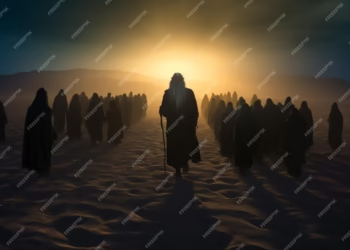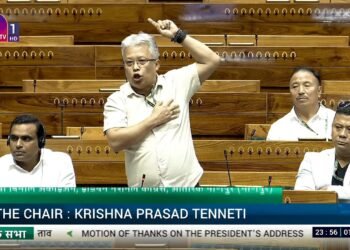In the backdrop of escalating attacks on Hindu minorities in Bangladesh, the arrest of ISKCON priest Chinmoy Krishna Das has sparked protests and debates over minority rights. Amid political shifts and religious tensions, ISKCON’s spiritual mission continues to serve as a beacon of hope for the embattled Hindu community.
By Navin Upadhyay
The recent arrest of ISKCON priest Chinmoy Krishna Das on sedition charges and the spate of attacks on Hindu communities in Bangladesh have reignited concerns over the safety of minorities in the Muslim-majority nation. While Bangladesh has long prided itself on a secular identity, the reality for its Hindu population, which constitutes around 8% of the total populace, is marked by vulnerability, fear, and intermittent violence.
The Arrest of Chinmoy Krishna Das: A Flashpoint
Chinmoy Krishna Das, a prominent ISKCON leader, was arrested in October 2024 on allegations of sedition. His arrest followed comments that reportedly criticized certain government policies and called for greater protection of minority communities. While the authorities accused him of incitement and undermining national unity, his followers argued that the charges were politically motivated, designed to silence voices advocating for Hindu rights.
The International Society for Krishna Consciousness (ISKCON) issued a global appeal for his release, emphasizing that his work had always been rooted in peace and spirituality. Das’s detention sparked protests across Dhaka and other cities, with ISKCON devotees and activists condemning what they termed as a “targeted attack on Hindu leadership.”
The Hindu community in Bangladesh has historically faced discrimination, land grabs, and communal violence. Attacks on Hindu temples, homes, and businesses often escalate during political or religious tensions. ISKCON, being a prominent Hindu organization with a strong cultural and spiritual presence, has frequently been a target during such unrest.
In 2021, for instance, an ISKCON temple in Noakhali was attacked during Durga Puja celebrations, leaving one devotee dead and several injured. Similar incidents have occurred in the years since, highlighting the community’s precarious position. The violence is often fueled by social media disinformation, political exploitation of religious differences, and historical grievances.
The Broader Context of Hindu Persecution
The recent attacks on Hindus have coincided with significant political shifts in Bangladesh. The ousting of the Sheikh Hasina government earlier this year and the rise of an interim administration have led to a volatile environment. While the new government has promised greater inclusivity, minority groups argue that the ground reality remains grim.
A recent report by a Dhaka-based human rights organization revealed that attacks on Hindu temples and homes had increased by 25% in the past year. Land disputes, often involving properties owned by Hindu families, remain a contentious issue, with local authorities frequently accused of bias or inaction.
The Role of ISKCON in Bangladesh
Founded in the 1970s, ISKCON has been a cornerstone of the Hindu community in Bangladesh, preserving cultural and spiritual traditions while engaging in humanitarian work. The movement operates several temples, educational institutions, and social welfare programs across the country.
ISKCON’s activities go beyond worship; its “Food for Life” program feeds thousands of underprivileged people regardless of their faith. Despite its contributions, ISKCON has often been caught in the crossfire of religious and political tensions. Its visible presence and international connections make it an easy scapegoat during periods of unrest.
The arrest of Chinmoy Krishna Das has galvanized a cross-section of society. Students at Dhaka University recently held demonstrations demanding his release and protesting India’s alleged interference in Bangladeshi affairs. The protests also called for a ban on ISKCON and accused the Indian government of using the organization to exert influence in Bangladesh.
At the same time, Hindu leaders and human rights activists have called on the Bangladeshi government to ensure the safety and dignity of its minorities. “This is not just about one man or one organization; this is about the future of secularism in Bangladesh,” said Anupam Das, a rights advocate based in Chittagong.
India’s Role and Regional Implications
The Hindu persecution in Bangladesh has reverberated across the border in India. Politicians and media outlets have criticized the Bangladeshi government for its handling of minority issues, with some accusing it of double standards. on Friday, Rashtriya Swaymasevak Sangh joined the growing chorus of protest against atrocities on Hindus in Bangladesh and described the Yunus government as ” mute spectator” to these attacks.
Bangladesh has countered these claims, pointing to instances of religious violence in India and accusing its neighbor of meddling in its internal affairs. This exchange has further strained relations between the two nations, complicating the already fraught regional dynamics.
The plight of Hindus in Bangladesh, including the ongoing challenges faced by ISKCON, underscores the need for systemic change. Ensuring the safety and rights of minorities requires not just government action but also grassroots efforts to foster interfaith harmony and understanding.
For ISKCON, the path ahead is equally challenging. As the organization continues its spiritual and humanitarian mission, it must navigate a complex landscape of faith, politics, and societal tensions. The resilience of its devotees and the support of the international community will be critical in shaping its future in Bangladesh.
The story of ISKCON in Bangladesh is one of faith, resilience, and an unwavering commitment to its principles. Even as it faces trials, the movement remains a beacon of hope for many, embodying the enduring power of spirituality in the face of adversity.













